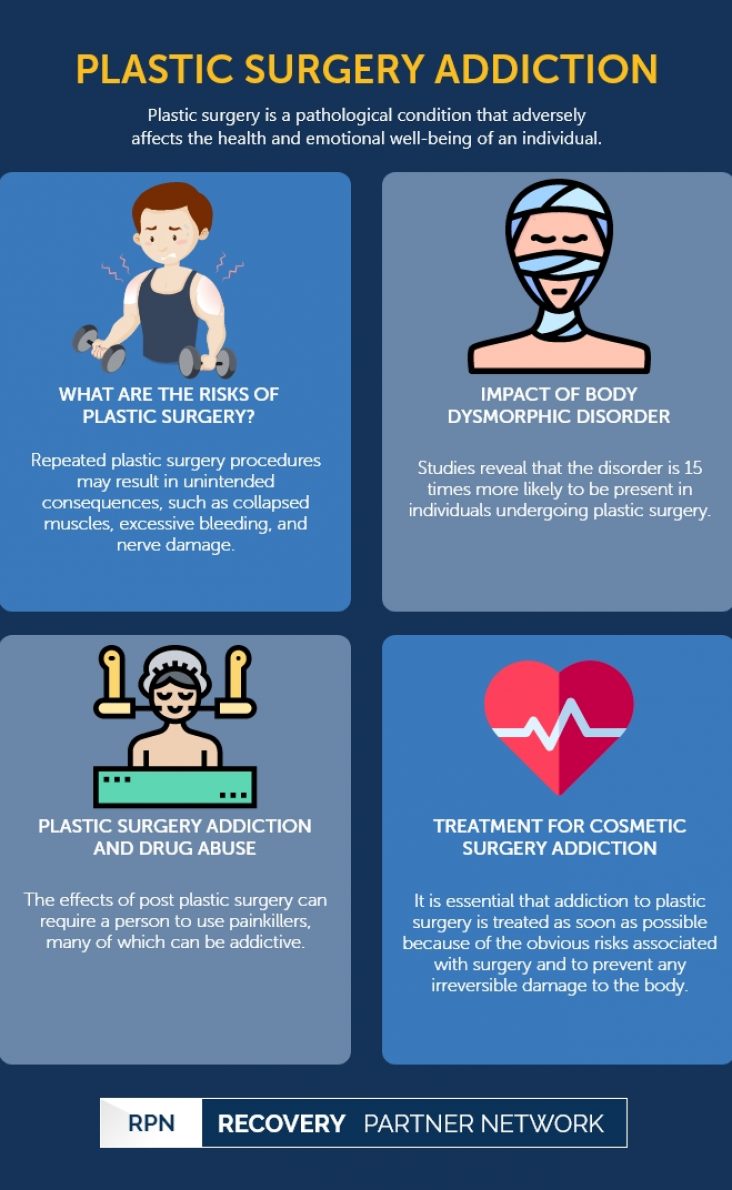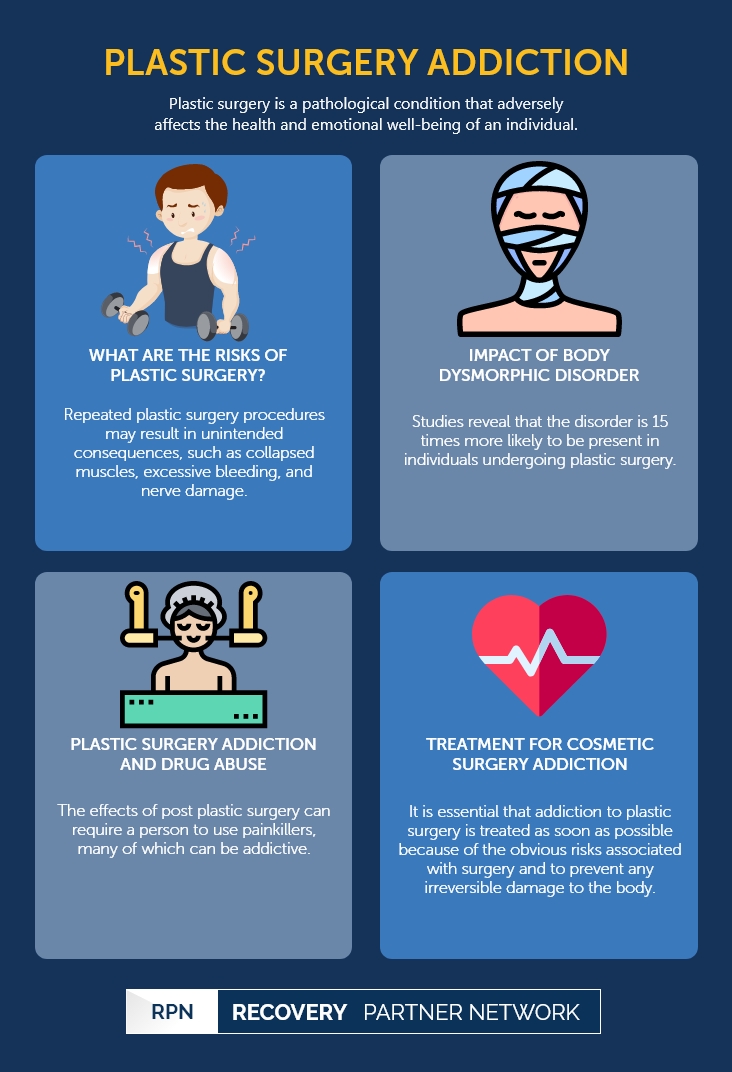Plastic surgery is a pathological condition that adversely affects the health and emotional well-being of an individual.
Plastic surgery Addiction
Plastic surgery addiction | Table of Contents
Understanding Plastic Surgery Addiction
Plastic surgery addiction is a psychiatric disorder that causes a person to keep changing their appearance even after having plastic surgery continually. The illness may lead someone to spend thousands of dollars on multiple operations, all of which may eventually not make them happier. The need for plastic surgery also stems from the low confidence that people feel about how they look. This is an emotion that all of us often feel. However, where health is undervalued, and plastic surgery becomes the focus of a person’s life, this could lead to a serious problem.
Being hooked on plastic surgery can be detrimental to one’s physical and mental health. Those who struggle from this type of addiction may feel a tendency to change the way they appear, and underlying issues generally cause this. Plastic surgery addicts are often confused about their physical appearance and have a false perception of how good they can appear through surgery.
Contrary to popular opinion, cosmetic surgery affects both men and women alike, even though women appear to undertake more cosmetic procedures than men do. Such types of actions also serve as an outlet for those with unresolved emotional or mental disorders. Many of these people do not know that their need for perfection stems from other issues, and they seldom get support. Pursuing beauty through plastic surgery can be addictive and will tend to be so unless underlying issues are fixed. Unfortunately, there are no rules and regulations controlling the number of procedures one individual can have. As long as they got the money, they can get as many cosmetic procedures as they like.
As with any addiction, plastic surgery begins with an initial, positive experience. When someone lives with a debilitating feeling of inadequacy and feels better about their appearance after their first surgery, they may decide to have another. As cosmetic surgery becomes a response to poor self-esteem, certain individuals would sign up for as many treatments as they can possibly afford.
Eventually, a person might begin to structure his or her life around upcoming operations and start relying on plastic surgery as the source of his or her self-esteem. Once someone has this risky attitude, they may become hooked and may not be able to stop applying for procedures. Even when physicians decline to operate on them, they may allow fewer skilled doctors to perform riskier surgery and, in extreme situations, may try surgery on their own.
FAQ
- Can you be addicted to plastic surgery?
- Why do people get plastic surgery?
- Can you reverse plastic surgery?
- Is plastic surgery permanent?
- Is plastic surgery safe?
Plastic surgery addiction is categorized as a behavioral addiction that affects an individual’s health, psychological wellbeing, and finances.
Some individuals resort to cosmetic surgery to fix a physical defect or to change a part of the body that makes them feel insecure.
It can be painful, expensive, or difficult to reverse the effects of certain plastic surgery procedures.
The effects of plastic surgery do not last forever. Although going under the knife can have longer-lasting complications, most procedures for plastic surgery do have a shelf life that can range from a few years to more than a decade.
Depending on each patient’s medical history, plastic surgery can present different risks.
What Are the Risks of Plastic Surgery?
Plastic surgery is usually aimed at enhancing and developing other aspects of the body. The goal of plastic surgery is, therefore, to make someone feel more desirable and comfortable in their skin. In the medical sense, most cosmetic surgery is not required, although some operations, such as rhinoplasty and cleft palate repair, have medical benefits. Plastic surgery is a personal choice. Apart from the risks associated with any medical procedure, there is nothing inherently wrong with plastic surgery as long as the surgeon is professional, and the patient has reasonable expectations.
A plastic surgery procedure could produce a positive outcome, but repeated procedures could have unintended consequences. A few dangers associated with plastic surgery are:
- Collapsed muscles
- Excessive bleeding
- Nerve damage
- Tissue death
- Infections, including pneumonia
- Delayed healing
- Blood clots
- Scarring
- Bruises
- Swelling
- Anesthesia risks
Many individuals who have plastic surgery later regret it because they are not happy with the way they look after it. In some forms of abuse, individuals undertake further procedures to fix previous ones. Multiple procedures, even if performed correctly and professionally, often result in an overall abnormal and strange appearance leaving one further scarred.
FAQ
- What happens if you get too much plastic surgery?
- What are the risks associated with plastic surgery?
- How does plastic surgery affect mental health?
- What are the most common plastic surgery procedures?
Scar tissues that die during the healing process can cause health complications after multiple surgeries. Multiple nose surgeries can result in breathing difficulties, and multiple eye lifts can result in dry corneas, as well as an increased risk of infections.
Some of the most common risks associated with plastic surgery are infection, severe bleeding, nerve damage that may lead to numbness, necrosis, seroma, and hematoma.
Individuals who undergo plastic surgery are prone to psychiatric conditions such as eating disorders, body dysmorphic disorder, suicidal thoughts, and substance abuse.
Some of the popular plastic surgery procedures include breast augmentation, breast implant removals, breast lift and buttock lift, chin, cheek, or jaw reshaping, dermabrasion, eyelid lift, facelift, tummy tuck forehead lift, hair replacement or transplantation, botox, rhinoplasty, liposuction, cellulite treatment, and chemical peel.
Impact of Body Dysmorphic Disorder
Body dysmorphic disorder causes a person to be concerned with real or imagined “flaws” in appearance. Psychologists consider the disease to be an obsessive-compulsive disorder that impairs the well-being of an individual. Tragically, individuals with body dysmorphic disorder have high suicide rates. The condition affects both men and women and usually begins during a person’s teenage years and early adolescence. Body dysmorphic disorder affects approximately 2.4% – 5.8% of the American population.
Someone who struggles with body dysmorphic disorder may spend many hours every day worrying about their appearance or staring at themselves in the mirror, deprived of sleep, continue to alter their wardrobe and exhaust themselves. This Mental illness has the potential to negatively impact a person’s social life because individuals with such disabilities frequently feel self-conscious and keep comparing themselves to others.
Body dysmorphic disorder is a common co-occurring condition of cosmetic surgery addiction. Evidence has shown that the disorder is 15 times more likely to be present in people undergoing plastic surgery. This does not mean that anyone who would have cosmetic surgery has a psychological problem, but in many instances, body dysmorphic disorder is likely to contribute to plastic surgery addiction. Therapy and social support are solutions to body dysmorphic conditions, not plastic surgery. In reality, plastic surgery addiction and body dysmorphic disorder often co-occur as they develop on each other. If plastic surgery does not successfully “correct” someone’s appearance, they feel even worse about themselves and try further treatments while keeping body dysmorphic disorder alive and untreated.
Other Causes of Cosmetic Surgery Addiction
Society and the media, in general, have played a major role in the popularity of cosmetic surgery. With so much focus on the physical appearance of stars, more and more of the rich and famous are choosing to go under the knife to make sure they still appear their best. Each time a star has a cosmetic procedure, it’ll be on the front page of mainstream newspapers and magazines, quickly read by wowing fans. There are even reality TV programs highlighting the benefits of cosmetic surgery, and they can leave a mark on those who watch them.
Young girls, in particular, desire to be very attractive and would like to look like the stars they see on TV and in magazines. Unaware that the images in the magazines are airbrushed or photoshopped to make the stars appear perfect. Many are trying to become something that doesn’t exist.
Plastic Surgery Addiction and Drug Abuse
The effects of post plastic surgery can require a person to use painkillers, many of which are addictive. If a person is repeatedly exposed to plastic surgery, they may also repeatedly subject themselves to prescription opioids and thus risk getting an opioid dependence. The addiction to drugs, legal and illegal, kills hundreds of people every year. It’s yet another risk of plastic surgery addiction. There is also a connection between drug addiction and mental illness. Since body dysmorphic disorder is the cause of many instances of plastic surgery, someone who is addicted to plastic surgery may continue to use alcohol or illegal substances to try to escape their dissatisfaction in their appearance.
Treatment for Cosmetic Surgery Addiction
Someone with a cosmetic surgery addiction may not know that they have a compulsive disorder. They may recognize that they are fond of getting work done on their looks, but they may not be conscious that there is an underlying problem influencing their behavior, or they may be oblivious to the fact that this is a matter that needs to be resolved.
The source of the problem must be identified so that it can be treated. It’s easy to tell someone with a cosmetic surgery addiction to simply quit treatments, but for a person with an addiction, the urge to do so can be too immense to ignore.
It is essential that addiction to plastic surgery is treated as soon as possible because of the obvious risks associated with surgery and to prevent any irreversible damage to the body.
Recovery Partner Network
We aim to educate and empower. If you feel our library of resources does not cover your specific need, reach out to us, and we would be happy to help.
STATISTICS
© Copyright 2025


